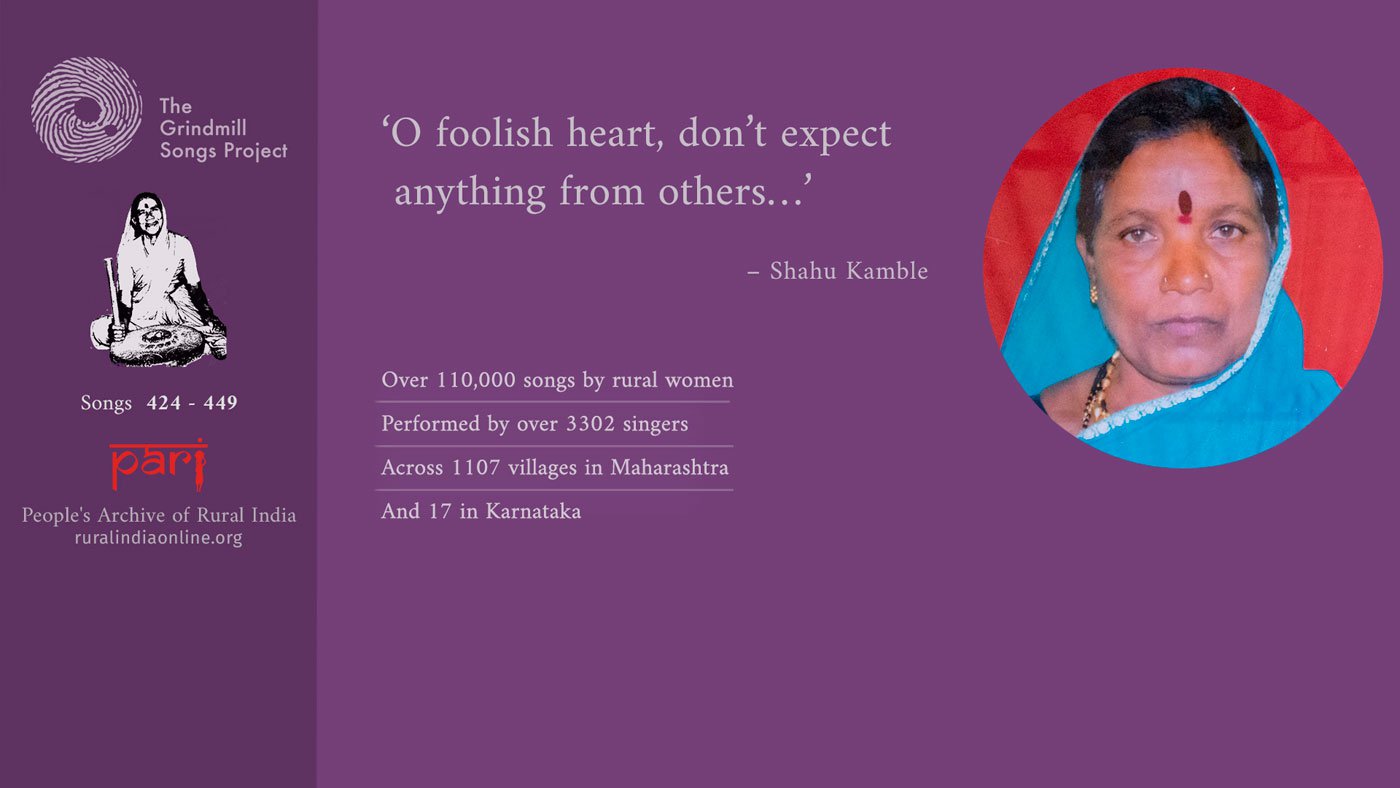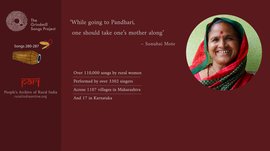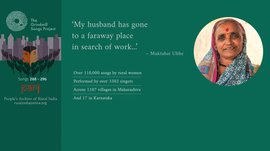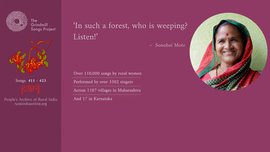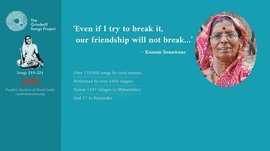Shahu Kamble from Mulshi taluka, Pune, sings about being hurt by a friend and turning to her family, especially her mother, for emotional support and sustenance
What does a woman do when a friend
betrays her trust and breaks her heart? A few decades ago, if she were from
rural Maharashtra, her emotional response to being betrayed by a confidant
would have been transformed into a few
ovi.
She would have sung those couplets while
sitting at the grindmill and crushing the day’s share of grains. This is exactly
what Shahu Kamble did.
The late Shahubai sang 26 songs to express the painful interactions of a woman with a neighbour who is also her friend. In the first of these couplets, all of which were set to tune by Shahubai, she says:
It was futile to share my secrets
with my neighbour
She is not my mother who
will keep it to herself
It wasn’t just betrayal, but the friend had uttered sharp words that pierced the singer’s heart and drove her to tears all day and night. The woman tells the neighbour how she feels:
I am fed up with your harshly bitter
words,
Like the banana leaf being
torn by the breeze
When the neighbour flaunts gold ornaments on her neck and arms, the singer says that her son and daughter are brighter than the gold to her, and more precious. The couplet suggests that the strain in the friendship is perhaps due to a wealth disparity between them.
Hurt by her friend, the singer finds comfort in familial love. She recalls her visits to the seashore, where she once found “a basket of fish,” and at another time, “a pearl…in the hollow of my palms.” These are metaphors that show she revels in the pleasure of being blessed with a daughter and a son.
Shahu Kamble's sons, daughters-in-law and grandchildren in Nangaon village. Her sister-in-law and friend Kusum
Sonawane, who also sings grindmill songs, is standing third from the left
Although the singer tells herself not to expect anything from others, she discloses that her own mother is the only person in the world on whom she can depend on completely. The ocean leaves her thirsty, she says, but her mother is like the water of River Ganga, descending from heaven. She goes on to compare her mother’s generosity to an overflowing River Chandrabhaga. The river, in Maharashtra’s Solapur district, is better known as Bhima. It is immortalised as a ‘destroyer of sins’ by the Bhakti poet, Sant Eknath, in ‘ Mazhe maher pandhari ,’ his popular abhanga , or devotional poem.
The singer’s feelings of love and her complete
trust in her mother are reinforced in the last 10 couplets of this collection. In
one
ovi
she says that keeping a count of what is borrowed from a neighbour is necessary
in order to return it, but there is no such need while borrowing from one’s
mother. In another
ovi
, the narrator compares her mother to
amsul
(dried
kokum
), an ingredient used in food or drink for the tanginess it brings,
making it flavourful and tasty.
“I often miss my mother’s cooking,”
says the singer who has been away from her parental home after getting married.
It is from her mother, she says, that she learnt the secrets of running her household
efficiently and economically – by grinding the grain so fine that more flour gets
milled, and more
bhakar
(a form of
roti
) can be
made.
Shahubai’s message is clear in
ovi
set: when a
woman is hurt by unpleasantness in the world outside, the affection of her
family, especially her mother’s love, is the balm that heals her wounded heart.
In September 2017, when the PARI GSP
Team visited Shahubai’s village, Nandgaon, we could not meet the singer; she
had passed away the previous year. Her sister-in-law and friend, Kusumtai
Sonawane, who also
sings grindmill songs
, told PARI about
the tunes Shahubai had composed. “She was adept at setting songs to new,
melodious tunes. She knew exactly which
galaa
[tune] would work well for an
ovi.
Not
every woman can do that,
”
Kusumtai
said.
With richly layered metaphors, this
collection of songs is enhanced by Shahubai humming the tune of ‘
Nesale
ga bai, aaj shalu banarasi
,’ a popular
gaulan
, or folk number. Sung in her special style, the tune
sets the tone for the
ovi
that follow.
अशी शेजी नं पाशी गुज, माझं बोलुनी गेलं वाया
अशी नं नव्हं माझी बया, पोटात गं साठवाया
अशी शेजीपाशी गुज, शेजी आरध्या गुजाची
कशी आता माझी बया, किती अंतरभेदाची
अशी नं काई बोललीस, तुझ्या बोलण्याचा चटवटी
खवुट गं बोलण्याच्या, माझ्या हृदयी झाल्या गाठी
खवुट बोलण्यानी, माझ्या उरात झाली जाळी
कशी रात्र गं दिवस, नेत्रं माझी पाणी ढाळी
खवुट गं बोलण्यानी, मन माझं ते विटलं
अशी नं वाऱ्याच्या समुख, पान केळीचं फाटलं
शेजी काय लेणी लेती, ही तर येळाची हाडकं
अशी नं चल माझ्या वाड्या, सोनं दाविते भडक
अशी काही लेणं लेती, बाई हिनवती मला
अशी नं चल माझ्या वाड्या, सोनं दाविते तुला
अशी नं लेण्या लुगड्याचे, नको बसू शेजाराला
अशी नं आता माझी बाळ, जर माझ्या पदराला
अशी नं पुतळ्याची माळ, घालिते मी कवाबवा
अशी नं आता माझी बाळ, चंद्रहार केला नवा
अशी जिवाला सोडवण, एक असावी लेक बाळ
अशी नं आता माझी बाई, गळ्या पुतळ्याची माळ
अशी नं पुतळ्याची माळ, लोंबती गं पाठीपोटी
अशी नं माझिया बाळानी, चंद्रहारानी केली दाटी
अशी नं दे रे देवा मला, नाही मागत ठेवाईला
अशी नं आता माझी बाई, कुंकू मागती लावाया
अशी नं दुसऱ्याची आशा, नको करु येड्या मना
माझ्या बाळांच्या बाही बळ, यास दे रे भगवना
अशी दुसऱ्याची आशा, नको करु येड्या जिवा
माझ्या बाळांच्या बाही बळ, यास दे रे तूच देवा
अशी नं आता माझी बाई, हेलव्यानी आली पेटी
अशी नं दरव्याच्या काठी, सहज गेले आंघोळीला
अशी नं आता माझी बाळ, मोती आलं वंजळीला
अशीसमींद्र सुकल्यानी, नाही झाली माझी तहान
अशी नं आता माझी बया, गंगा आली आसमान
समींद्र ग सुकल्यानी, नाही ना झाला एक घोट
अशी नं माझिया बयाला, चंद्रभागाला आला लोट
अशी नं बया बया म्हणं, बया कुणीच व्हईना
म्हणं नं बयाईची सर, शेजा नारीला येईना
अशी नं बया बया म्हणं, बया आमसुलाची पुडी
अशी नं त्याही पुडीमंदी, माझी जलमली कुडी
अशी नं बया बया म्हणं, बया काहीच जिनस
अशी नं घेतिईलं सोनं, नाही लाविली कानस
अशी नं शेजीचं उसनं, हाये ना अधुली पायली
माझ्या बयाच्या उसन्याची, याद कुणाला राहिली
अशी नं शेजीचं उसनं, फेडिते मी काडी काडी
माझ्या नं बयाचं उसनं, माझ्या भिडलं हाडोहाडी
अशी नं शेजीच उसनं, कसं दारात बसुनी
माझ्या नं बयाचं उसनं, माझ्या जलमापासुनी
बारीक गं दळ नारी, येकीची गं व्हईल दीड
माझ्या बयानी शिकविली, मला संसाराची मोड
बारीक गं दळणाची, भाकर ना चौफेरी
माझ्या बयाच्या भोजनाची, याद येती घडोघडी
aśī śējī nā pāśī guja mājha bōlūnī gēla vāyā
aśī nā nava mājhī bayā pōṭāta ga sāṭhavāyā
aśī śējīpāśī guja śējī āradhyā gujācī
kāśī ātā mājhī bayā kitī ādarabhēdācī
aśī nā kāī bōlalīsa tujhyā bōlaṇyācā caṭavaṭī
khavūṭa ga bōlaṇyācyā mājhyā huradī jhālyā gāṭhī
khavūṭa bōlaṇyānī mājhyā aurāta jhālī jāḷī
kaśī rātra ga divasa nētra mājhī pāṇī gāḷī
khavūṭa ga bōlaṇyānī mana nā mājhaṁ tē viṭalē
aśī nā vāryācyā samukha pāna nā kēḷīca phāṭala
śējī kāya lēṇī lētī hī tara yēḷācī hāḍaka
cala mājhyā vāḍyā sōna dāvītē bhaḍaka
aśī kāhī lēṇa lētī nā hinavatī malā
aśī na cala vāḍyā mainā mājhī bāḷa sōna dāvītē tulā
aśī na lēṇyā lugaḍyācē nakō basū śējārālā
ātā mājhī bāḷa jara mājhyā padarālā
aśī na putaḷyācī māḷa ghālītē kavābavā
ātā mājhī bāḷa candrahāra kēlā navā
aśī jivālā sōḍavaṇa ēka asāvī lēkabāḷa
ātā mājhī bāī gaḷyā putaḷyācī māḷa
aśī na putaḷyācī māḷa lōmbatī ga pāṭhīpōṭī
mājhyā yā bāḷānī candrahārānī kēlī dāṭī
aśī nā dērē dēvā malā nāhī nā māgata ṭhēvāīlā
aśī nā ātā mājhī bāī kuṅkū māgatī lāvāyā
aśī na dusaryācī āśā nakō karu yēḍyā manā
mājhyā bāḷāñcyā bāhī baḷa yāsa dērē bhagavanā
aśī dusaryācī āśā nakō karu yēḍyā jivā
mājhyā bāḷāñcyā bāhī baḷa yāsa dērē tūca dēvā
aśī na daravyācyā kāṭhī gēlē vhatē lālāsāṭhī
aśī na ātā mājhī bāī hēlavyācī pēṭī
aśī na daravyācyā kāṭhī sahaja gēlē aṅghōḷīlā
aśī na ātā mājhī bāḷa mōtī āla vañjaḷīlā
aśī samīdra sukalyānī nāhī jhālī mājhī tahāna
aśī nā ātā mājhī bayā gaṅgā ālī āsamāna
samīdra ga sukalyānī nāhī nā jhālā aēka ghōṭa
aśī nā mājhī nā bayālā candrabhāgālā ālā lōṭa
aśī nā bayā bayā mhaṇa bayā kuṇīca vhīnā
mājhyā nā bayāīcā sara śējā nārīlā yēīnā
aśī nā bayā bayā mhaṇa bayā āmasulācī pūḍī
aśī nā tyāhī puḍīmandī mājhī jalamalī kuḍī
aśī nā bayā bayā mhaṇa bayā kāhīca jinasa
ghētīīla sōna nāhī lāvīlī kānasa
aśī nā śējīca usaṇa hāyē nā adhulī pāyalī
mājhyā bayācyā usaṇyācī yāda kuṇālā rāhīlī
aśī nā śējīca usaṇa phēḍītē mī kāḍī kāḍī
mājhyā nā bayāca usaṇa mājhyā bhiḍala hāḍōhāḍī
aśī nā śējīca usaṇa kasa dārāta basunī
mājhyā nā bayāca usaṇa mājhyā jalamāpāsūnī
bārīka ga daḷa nārī yēkīcī ga hōīla dīḍa
mājhyā bayānī sikavilī malā sansārācī mōḍa
bārīka ga daḷaṇācī bhākara nā cauphērī
mājhyā bayācyā bhōjanācī yāda yētī ghaḍōghaḍī
It was futile to share my secrets with
my neighbour
She is not my mother, who will keep it
to herself
If I confide in my neighbour, she will
reveal it to others
But my mother will keep it all to
herself
Whatever you have said, your talk
smells of rivalry
Your bitter words have hurt me very deeply
Your acerbic words are like a cobweb
in my heart
My eyes are shedding tears day and
night
I am fed up with your harsh words,
Like the banana leaf being torn by the
breeze
The ornaments my neighbour wears are
thin, bone-like armlets
Come to my house, I will show you gold
[my son] that shines bright
She wears some jewellery, humiliates
and looks down upon me
Come to the house, I will show you my
gold, my son and daughter
Don’t sit beside me decked in heavy ornaments
and saree
My children mean more to me, like the brocade
edges of my saree
A necklace with gold coins, I do wear
sometimes
Now my son is my new
chandrahar
[necklace of gold beads]
To get deliverance from this world,
one should have a daughter
Now my dear precious daughter is like
a necklace of gold coins
A necklace with gold coins, hangs
around my neck
My son, my
chandrahar
, is crowding my neck [with
other ornaments]
I ask of you, God,
kunku
for my forehead [long life for my husband]
I don’t ask for it to keep with me
forever
O foolish mind, don’t expect anything
from others
I pray to you, God, give my son enough
strength
O foolish heart, don’t expect anything
from others
I pray to you, God, give my son enough
strength
On the seashore, I had gone to seek a
boon, for a son
And a daughter was born, like a basket
of fish
I casually went for a bath on the
seashore
And my son, my pearl, came into the
hollow of my palms
I could not quench my thirst as the
sea had dried up
But my mother has come like the Ganga
from the heaven above
I could not get a bit of water as the
sea had dried up
But my mother is like River Chandrabhaga
in spate
Just calling anyone ‘mother,’ doesn’t make
her my mother
The woman next door is no comparison to
my mother
My mother is like a packet of
amsul
[mangosteen]
I was born to this packet of the [long-lasting]
fruit
Mother, mother, we say, mother is a
gold ornament
That is guaranteed pure gold, no need
to test it
I may borrow two or four kilos from my
neighbour
But I borrow from mother without
keeping count
If I borrow from my neighbour, I will return
it bit by bit
But borrowing from mother, I am used
to it
I borrow from my neighbour, sitting in
the doorway
From my mother I have borrowed so much
since my birth
Woman, grind the flour fine, to make one
and a half
bhakar
My mother taught me how to manage the
household
A fine round
bhakar
made from finely ground
flour
I often
miss my mother’s cooking

Performer/Singer: Shahu Kamble
Village: Nandgaon
Taluka: Mulshi
District: Pune
Caste: Nav Bauddha (Neo Buddhist)
Age: 70 (She died of uterine cancer in August 2016)
Children: Two sons and two daughters
Occupation: Farmer and midwife
Date: These songs and the accompanying information were recorded on October 5, 1999. The photographs were taken on September 11, 2017.
Poster: Urja
Read about the original Grindmill Songs Project founded by Hema Rairkar and Guy Poitevin.
